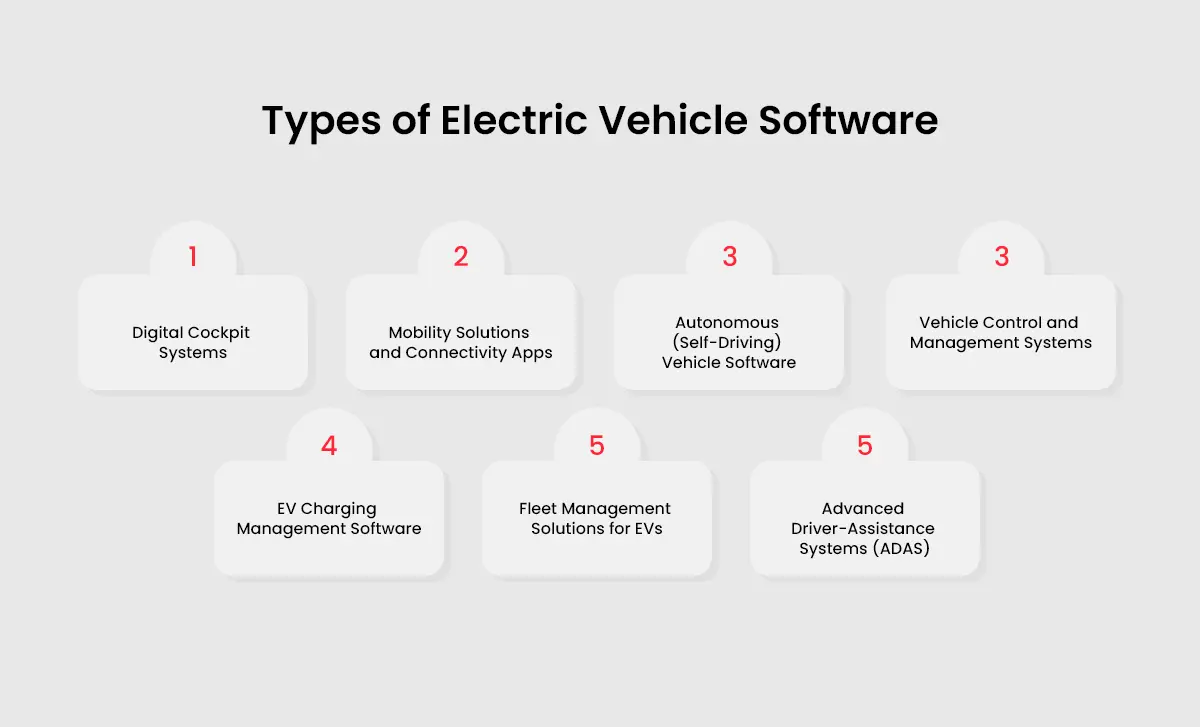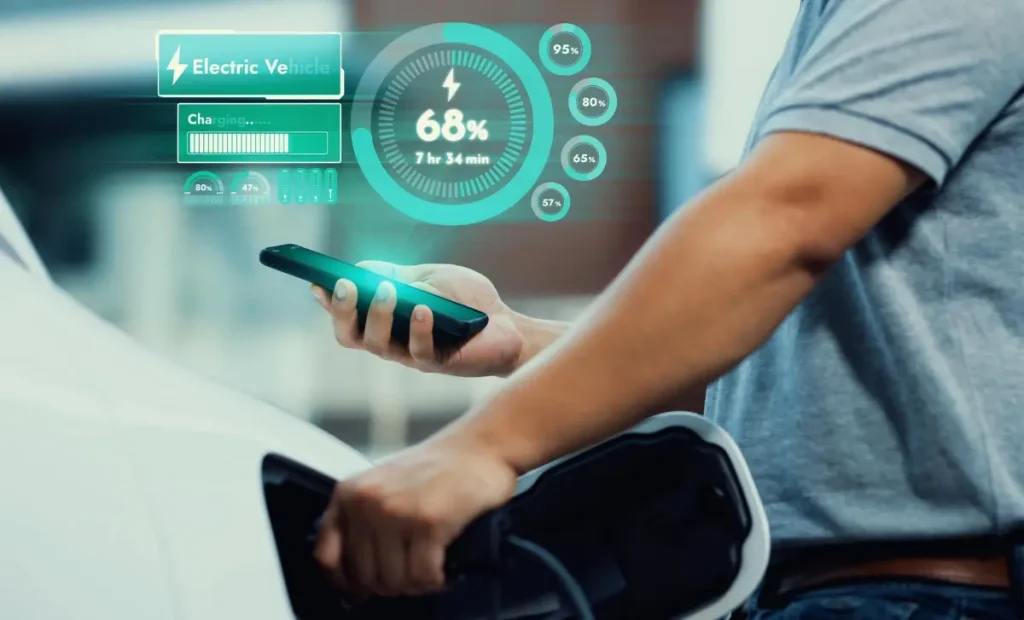Imagine a world where cars can see everything, just like you do. Tesla’s camera-based autopilot system improves the vehicle’s vision turning your drive into a safe and memorable experience. This is just an example of advanced electric vehicle software.
From controlling the vehicle’s functionality to creating an unparalleled user experience, modern software is at the heart of the electric vehicle industry. But to develop software of such capabilities, you should know the key components and types.
What is an Electric Vehicle Software?
Think of it as a mobile application through which you can connect with the outer world, work faster, or even learn new things.
An electric vehicle software is the same but designed for your vehicles. It manages, controls, and enhances vehicles’ various functions and features.
For example, software with AI/ML capabilities can find out the shortest and best route of your journey. They are updated over the air (OTA) and come in different forms.
Types of Electric Vehicle Software

1. Digital Cockpit Systems
Advanced electric vehicles are giving digital driving experience to the drivers. And digital cockpit systems are at the forefront of this experience.
They make it easier for drivers to keep an eye on key metrics like speed, battery status, and navigation. It also gives them buttons and hands-free control over media and navigation.
2. Mobility Solutions and Connectivity Apps
Electric vehicle software gives a truly connected experience to the users by bringing all the digital gadgets and apps together.
With such solutions, users can access the vehicle remotely through their smartphones. They can lock/unlock the doors, check real-time traffic information, locate nearby charging stations, and do more.
The main aim of developing such type of software is to improve users’ convenience and accessibility.
3. Autonomous (Self-Driving) Vehicle Software
Although self-driving cars are still not a reality, several big automakers like Tesla are investing in such software.
They bring sensors, cameras, artificial intelligence, and all the key technologies together to create a driverless experience.
However, developing such software brings a lot of challenges like human safety and compliance.
4. Vehicle Control and Management Systems
Such electric vehicle software focuses on managing the core functions and performance of the vehicles.
It has features for controlling the motor and balancing power distribution between the battery, motor, and other systems. Driver mode selection is also the top feature of vehicle control and management software.
5. EV Charging Management Software
As with the growth of electric vehicles, buyers will need an app or software to improve battery health.
EV charging management software offers them smart options to schedule battery charging, make easy payments, track battery conditions, and do more.
6. Fleet Management Solutions
Businesses that run a fleet of electric vehicles need such software to track their vehicles in real-time. They need an easy solution to predict the maintenance needs of vehicles without even physically monitoring them.
A fleet management software empowers them with automated alerts for maintenance scheduling, monitoring energy consumption, route optimization, etc.
7. Advanced Driver-Assistance Systems (ADAS)
Developed solely for drivers, such software comes with adaptive cruise control to automatically adjust the vehicle’s speed.
With features like lane-keeping assist, automatic emergency braking, and blind spot monitoring, ADAS has become a must-have software for EVs.
Key Components of Electric Vehicle Software
All these different software types share some key components that are important for their functionality. Let’s learn about each.
- Powertrain Control Module (PCM): This is the maestro of the electric motor, constantly monitoring and optimizing its performance and efficiency.
- Battery Management System (BMS): Like a watchful guardian, the BMS keeps a close eye on the battery’s health. It tracks voltage, temperature, and state of charge, ensuring the battery operates safely and delivers optimal power.
- Vehicle Control Unit (VCU): Think of the VCU as the central nervous system. It integrates all the information coming from different parts of the EV, like the motor, brakes, and steering, to make real-time decisions and keep the vehicle functioning seamlessly.
- Infotainment System (Optional): This adds a touch of entertainment and convenience to the ride. It allows drivers to navigate, connect their phone, and control various in-car features, all through a user-friendly interface.
- Over-the-Air (OTA) Updates: It eases the process of updating the electric vehicle software, adding new features and security patches.
Also Read: Build Your EV Charging Station App in 4 Simple Steps
What is the Cost of Electric Vehicle Software Development?
Similar to web or mobile app development, the cost of developing software for electric vehicles is based on multiple aspects.
The type of software, features, complexity, and technology stack take the budget from $40,000 to $300,000. However, this is not the final cost of development.
Your software development team and their experience in developing such complex software can fluctuate the budget.
A Few Challenges You May Encounter
Developing EV software isn’t just about writing code – it’s about engineering a system responsible for passenger safety and environmental well-being. Here are some key challenges that you might face during the process:
Safety: EV software glitches are not minor inconveniences. They can potentially lead to dangerous situations. To mitigate this risk, rigorous testing is crucial. This involves simulating various scenarios in software environments and conducting real-world tests to ensure the software performs flawlessly under pressure.
Regulations and Compliance: The EV industry is a fast-paced one, and regulations constantly evolve to keep up with technological advancements. Automakers need to stay on top of these changes and ensure their EV software adheres to the latest safety and environmental standards. This requires constant monitoring and adaptation of the software.
Hardware Compatibility: EVs are complex machines with components from various manufacturers. The software needs to be flexible and adaptable enough to seamlessly integrate and communicate with these diverse hardware parts. This ensures all the systems work together in perfect harmony, maximizing efficiency and safety.
By addressing these challenges head-on, you can ensure EV software is not just innovative, but also safe, compliant, and adaptable – paving the way for a smooth ride towards a greener future.
Conclusion
EV software will become more advanced and complicated shortly. They will utilize new and emerging technologies such as AI and ML, V2G connectivity, and more.
But with the growing trends and demand for safe and modern EVs comes the challenges too. By hiring experts, automakers can overcome these challenges and develop EV software that gives a futuristic and safe driving experience to their buyers.







